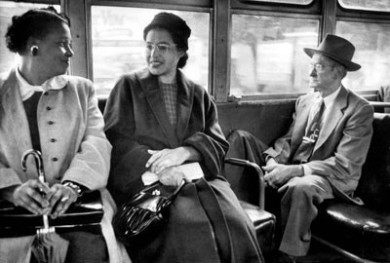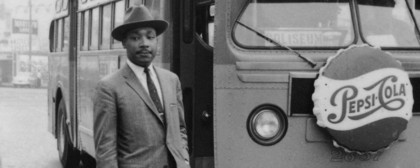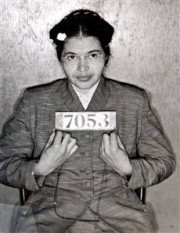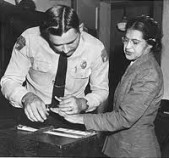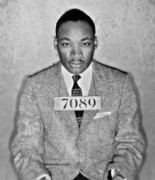Page under construction
Montgomery Bus Boycott: 1955 - 1956
The Montgomery Bus Boycott and Desegregation, by John Fuller. Rosa Parks, center, one of the most famous figures from the civil rights movement, helped spark the Montgomery Bus Boycott. Don Cravens/Time Life Pictures/Getty Images
ABA Journal: Institute Claims Rosa Parks’ Estate Drained by Fees for Lawyers Who Also Got Licensing Rights (July 21, 2011)
Montgomery Bus Boycott
Wikipedia
The Montgomery Bus Boycott was a political and social protest campaign that started in 1955 in Montgomery, Alabama, United States, intended to oppose the city's policy of
racial segregation on its public transit system. Many important figures in the civil rights movement were involved in the boycott, including Reverend Martin Luther King, Jr., Ralph Abernathy, and
others, as listed below.
The boycott caused crippling financial deficit for the Montgomery public transit system, because the city's black population who were the principal boycotters were also the bulk of the system's paying customers. The campaign lasted from December 1, 1955, when Rosa Parks, an African American woman, was arrested for refusing to surrender her seat to a white person, to December 20, 1956, when a federal ruling, Browder v. Gayle, took effect, and led to a United States Supreme Court decision that declared the Alabama and Montgomery laws requiring segregated buses to be unconstitutional. Read more
Alabama deputy discovers civil rights era artifacts
MSNBC/Associated Press
July 23, 2004
MONTGOMERY, Ala. - A sheriff’s deputy who was cleaning a basement storage room stumbled upon a box containing a trove of artifacts from the civil rights era, including
black-and-white mug shots of Rosa Parks and a young Martin Luther King Jr.
Historians called the discovery a significant find that provides a one-of-a-kind time capsule into the early days of the civil rights struggle. The 1956 mug shot of King
after being arrested in the historic Montgomery bus boycott could be a record of his very first arrest, said Horace Huntley, director of the Oral History Project at the Birmingham Civil Rights
Institute.
"I think that is a tremendous find," Huntley said. "It gives us a window to the past that we absolutely would not see otherwise." Read more

